IRS scams: 10 types and warning signs
Don’t let IRS scams scare you. Use this as your go-to guide on the types of IRS scams used to steal your information and the tax refunds you're entitled to.

What’s a time of year that some people love, and others hate? Tax season. Though getting your refund can be incredibly rewarding, gathering a year’s worth of financial documents can be a tad frustrating for some. However, whether you favor getting taxes together or not, everyone should beware of the IRS scams tricking unsuspecting online filers every day.
Consider this the go-to guide to defend your personal information against the IRS scams threatening your privacy and cybersecurity, from popular TurboTax scams to gift card scams and other digital swindles in between. We’re covering twelve of the most common IRS scams along with eye-opening statistics and IRS scam prevention tips to help to know how to protect yourself and file securely
10 IRS scams + warning signs to have on your radar
IRS scammers have found unique ways of getting people to compromise their personal credentials. However, if you know what they are and what to look for, you can protect yourself and your tax refund this season.
1. Phishing scams
Phishing scams encompass a wide variety of IRS scams that are used on filers today. The goal of them all is to convince the receiver that the message is legitimate and to get the target to continue to the embedded link included in the email. These links typically lead to fake IRS websites created to record any information you input using different forms of spyware.
A predominant IRS phishing scam to be aware of is the TurboTax scam. How it works: Hackers take advantage of TurboTax being one of the most widely used online tax preparation software today and send you a fake TurboTax email urging you to sign into your account to resolve an issue with your return. They can then use different types of malware to record your login credentials and access the sensitive information attached to your profile.
IRS scam warning sign:
The IRS will only contact you via mail whereas scammers will contact you through email or text.
How to spot impersonators: “Follow the link provided to verify your identity and tax information.”
2. Tax return recalculation scams
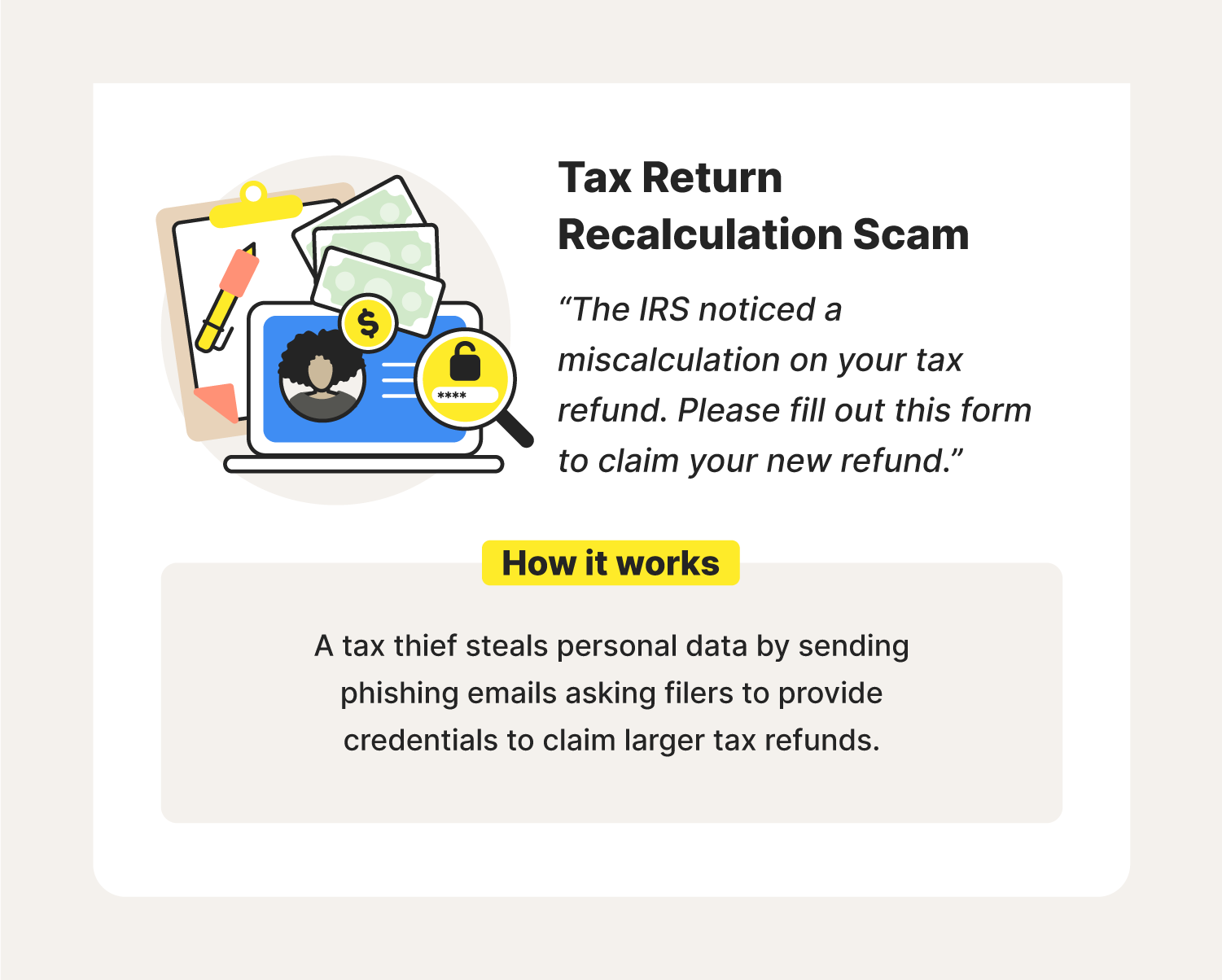
Hoping for a big refund this year? Well, tax thieves are rooting for you too. Tax refund recalculation scams work to convince you that the IRS owes you more than they initially stated by sending a phishing email from the IRS.
A refund scammer often accompanies these IRS scam emails with links to social engineering websites that may request your name, address, birthdate, driver’s license, and Social Security number. If you hand over this information, they can then use it to break into your banking accounts and/or take out loans in your name.
IRS scam warning signs:
- The IRS will never send you an email.
- The IRS will never call about an unexpected tax refund.
How to spot impersonators: “The IRS noticed a miscalculation on your tax refund. Please fill out this form to claim your new refund.”
3. Gift card scams
Tax thieves learned to take an unconventional approach with gift card scams. In gift card scams, the thief calls pretending to be an IRS agent notifying you of a tax penalty you received or an overuse balance you owe. They then instruct you to buy gift cards from different stores and give them the card numbers and PINs to pay the balance.
IRS scam warning sign:
- The IRS will never request credit card or debit card numbers over the phone.
How to spot impersonators: “You received a tax penalty this year. We need you to buy these gift cards to settle your balance.”
4. Tax-related identity theft
What do your SSN, address, and birthdate have in common? They’re all part of your identity that tax thieves are trying to steal! Unfortunately, tax thieves may try to take this joy away from you by filing an income tax return in your name and collecting the earnings you deserve. They do this by getting ahold of your SSN and other sensitive bits of information to fill out the form’s questions.
IRS scam warning signs:
- You file by mail and receive an IRS letter stating a tax return was already filed for the SSN provided
- IRS notifies you of an account created in your name you have no knowledge of
- You receive a tax transcript you never requested
How to spot impersonators: “There seems to be a discrepancy with your Social Security number. Can you provide it for me?”
5. Charity scams
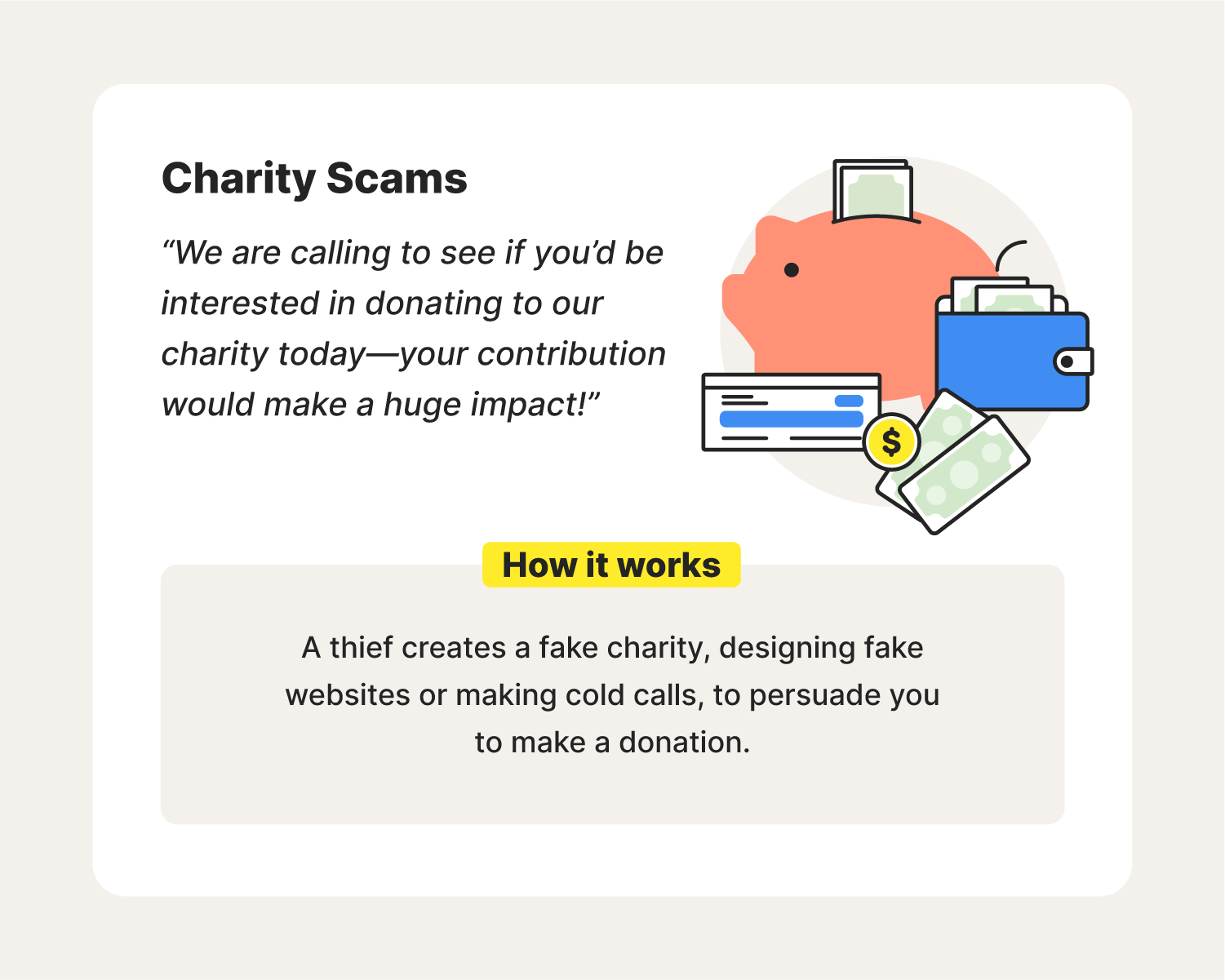
IRS scammers have gone as far as to use our good nature against us. Because you may be able to claim deductions from the charity donations you made during the year, cybercriminals often create fake charities for you to donate to. They rake in your money as you think you’re doing a good deed.
A good rule of thumb is to never donate to a charity if they call you on the spot. Always do your research. See if their social media profiles and website look credible—even visit in-person if they have a location near you. The IRS has a reliable search tool you can use to find and crosscheck established charitable organizations.
IRS scam warning sign: The fake charity websites created by tax thieves may lack the following items:
- The organization’s mission
- The board of directors
- Latest financial reports
How to spot impersonators: “We wanted to call you to see if you’d be interested in donating to our charity today.”
6. Verification requests
Don’t let tax thieves trick you with verification requests sent via email. These cybercriminals may try to get you to upload your W-2 or other identification documents so they can steal your information for themselves. The only time the IRS requests ID verification is when red flags appear on your tax return. In this case, they would send Letter 507IC to you in the mail.
IRS scam warning sign:
- The IRS will never send you an email.
How to spot impersonators: “We saw a discrepancy with your W-2 from this past year. Could you reupload it for us to review?”
7. IRS phone scams
IRS phone scams come in several forms. However, they all have the goal of tricking targets into believing they are a representative from the IRS. Some may even already have some of your information on hand to verify it’s you. It’s important to never verify any of your personal data—simply hang up.
Some of the different types of phone scams reported:
- Debt collection for back taxes: A fake IRS agent calls threatening legal action if you don’t pay the back taxes you owe the IRS.
- Tax penalty notification: A tax thief calls about tax penalties that you must settle from your most recent tax return filing.
- Tax rebate eligibility: An IRS agent impersonator calls to tell you that you qualify for a tax rebate for filing early.
- Paper check verification: A fake IRS agent tells you there is a check you never cashed, asking for your banking information so they can send it via direct deposit.
IRS scam warning sign:
The IRS will never call about an unexpected tax refund.
- The IRS will never request credit card or debit card numbers over the phone.
How to spot impersonators: “If you don’t pay today, we will contact the authorities.”
8. Stimulus check scams
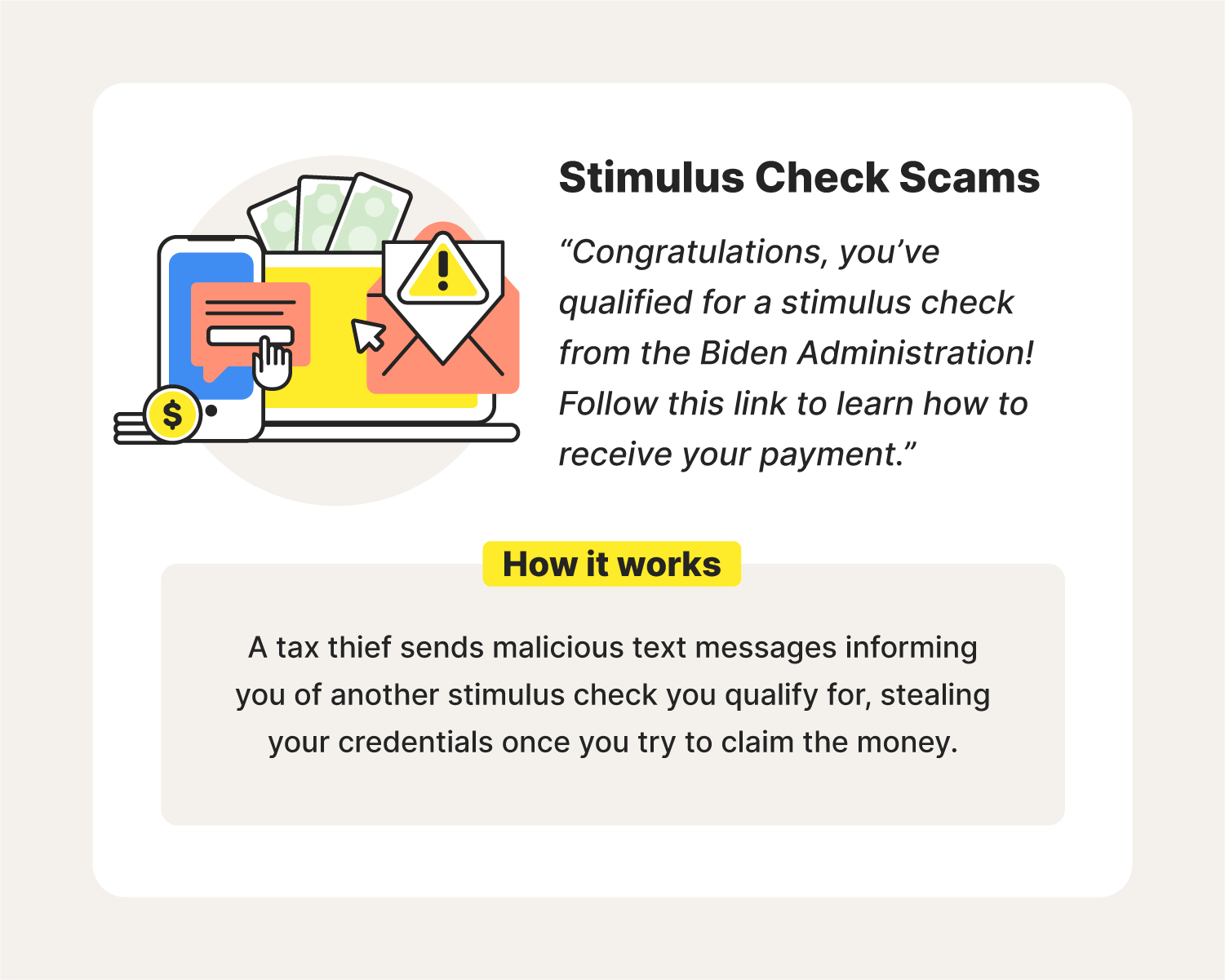
An ongoing fraud tactic riding the coattail of the COVID-19 pandemic is stimulus check scams. A tax thief may send you a text message impersonating the IRS that informs you of a stimulus check you qualify for. A link attached will instruct you to provide the sensitive information they need to hack your accounts and potentially steal your money and identity. Delete these texts immediately.
IRS scam warning sign:
he IRS never sends text messages.
How to spot impersonators: “Congratulations, you’ve qualified for a stimulus check from the Biden Administration! Follow this link to learn how to receive your payment.”
9. Taxpayer Advocate scams
The Taxpayer Advocate Service is an IRS-created organization designed to help with issues related to your taxes and the IRS as a whole. Despite the norm, the TAS does make calls to individuals to help find resolutions. IRS scammers use this difference to make calls posing as TAS representatives informing people of an increased tax refund they received. They may ask for your SSN, birthdate, and other personal information to verify your identity and claim your refund.
IRS scam warning sign:
- The IRS will never call about an unexpected tax refund.
How to spot impersonators: “Hi, I’m from the Taxpayer Advocate Service calling about a recalculated tax refund you are entitled to.”
10. Ghost tax preparer scams
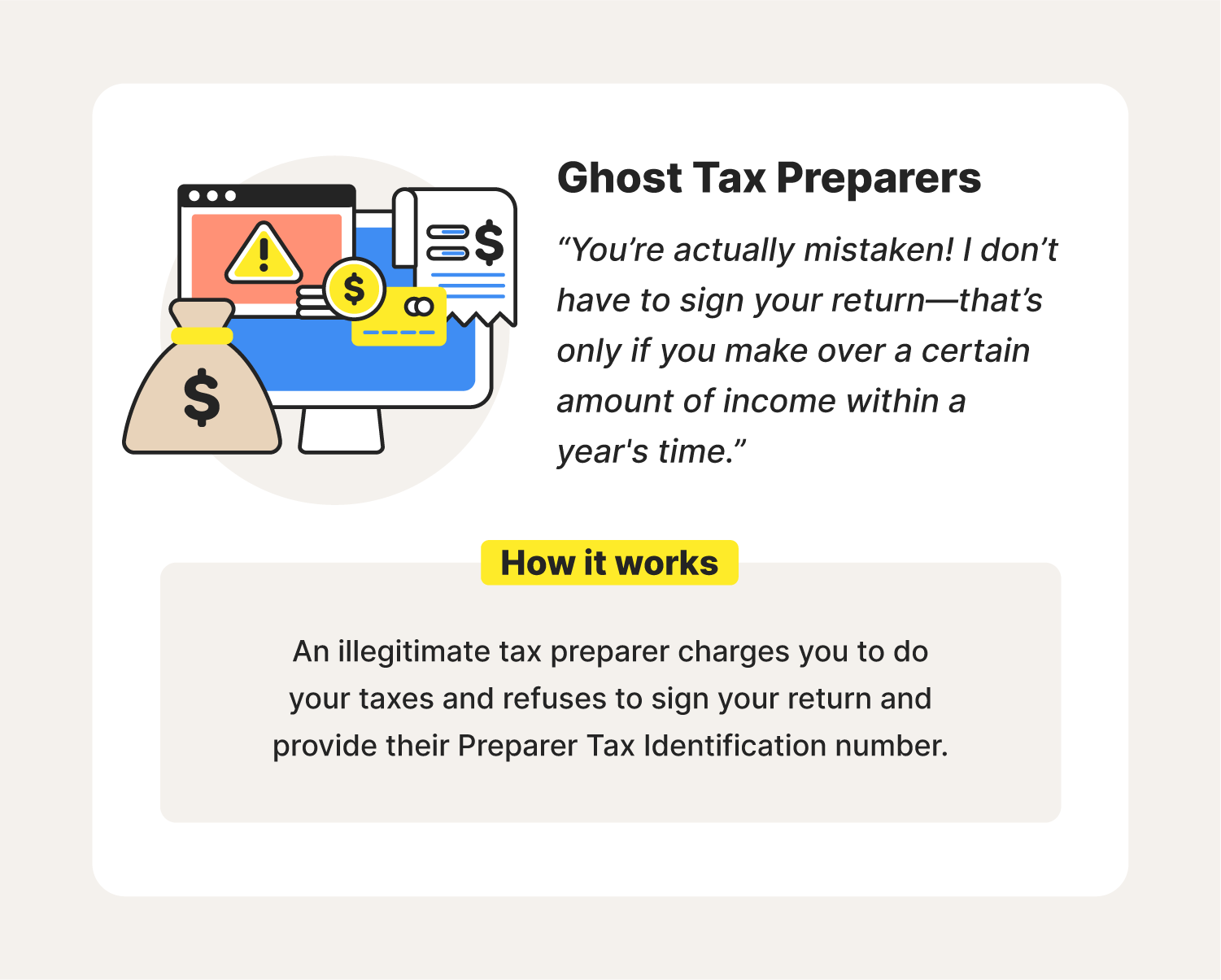
Whenever you pay someone to do your taxes, they must have a valid Preparer Tax Identification Number (PTIN) and sign your return once complete. Showing opposition to signing is an indication they are a ghost tax preparer only interested in collecting a fee and splitting once they get the chance.
IRS scam warning sign:
- Requiring payment in cash
- Suggestions of directing your tax refund to their bank account
- Refusing to sign tax refund
How to spot impersonators: “I actually don’t have to sign your return—that’s only if you make over a certain amount.”
The costs of IRS scams and tax fraud
Seeing the impact IRS scams and tax fraud have on others will allow you to understand why data security and online privacy are so important. ·
- The IRS initiated 1,372 tax crime investigations in 2021. (IRS, 2021)
- Median losses for tax fraud offenses reached over $300,000 in 2020. (USSC, 2021)
- An estimated 633 people received jail sentences for tax fraud this past year (IRS, 2021)
- The IRS’s fraud filters flagged more than 5 million fraudulent tax returns in 2020. (Taxpayer Advocate Service, 2020)
- The IRS identified over $2.3 million worth of tax fraud schemes in 2020. (IRS, 2020)
- Over 65,000 taxpayers reached out to the TAS for assistance with solving identity or income verification issues in 2020. (Taxpayer Advocate Service, 2020)
- The Criminal Investigation Division of the IRS spent 73% of its time working on tax-related investigations in 2020. (IRS, 2020)
- It can take more than 120 days to process a tax return with verification issues. (Taxpayer Advocate Service, 2020)
- The Taxpayer Protection Program protected over $2.5 billion in revenue from tax scams in 2020. (Taxpayer Advocate Service, 2020)
8 IRS scam prevention tips
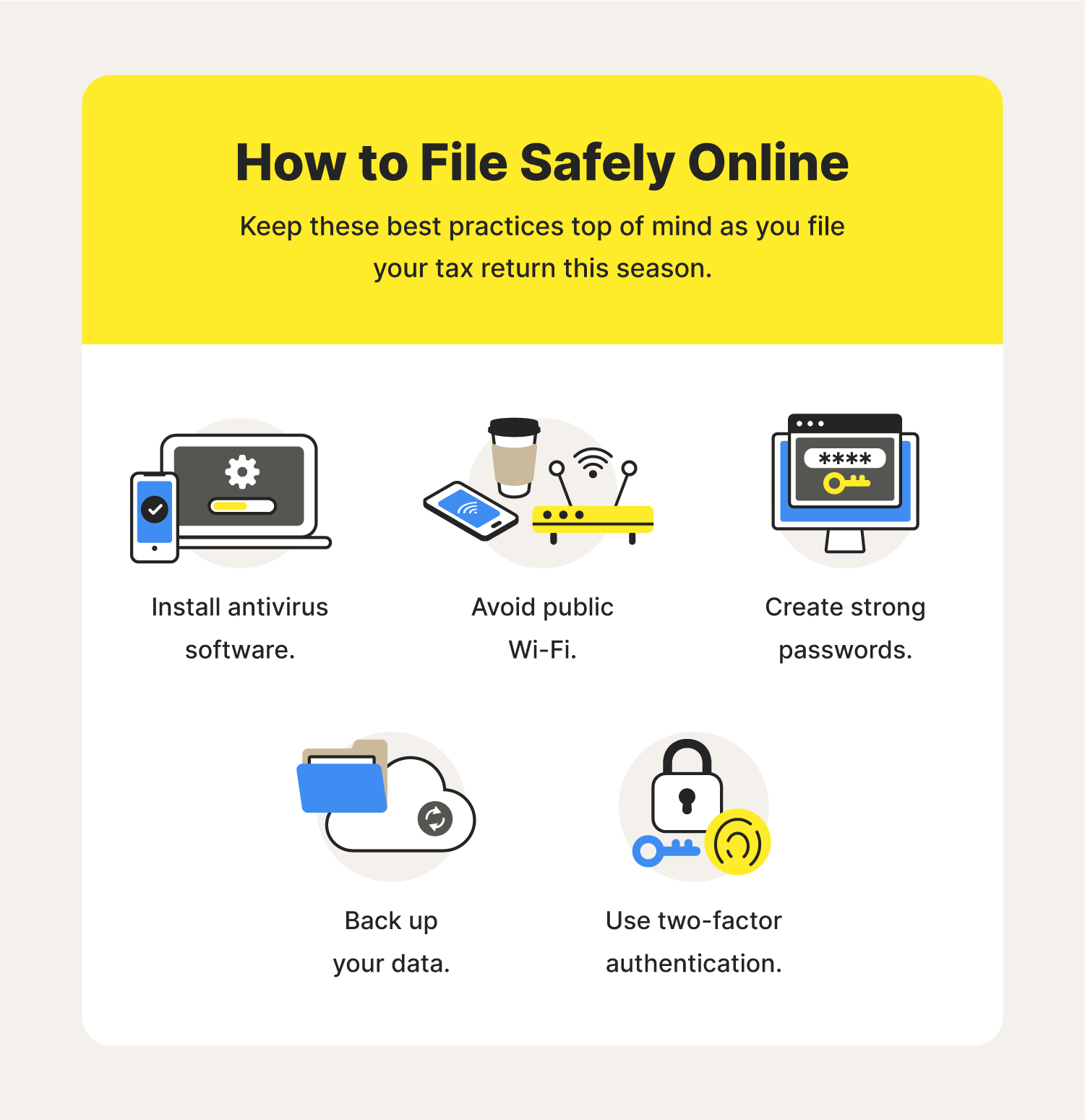
If becoming a victim of IRS fraud isn’t on your to-do list this tax season, use these IRS scam prevention tips to improve your odds of being able to file safely and keep your sensitive information protected.
1. File early
One of the best ways to avoid IRS scammers looking to steal your refund is by filing your taxes as early as possible. The sooner you submit your tax return, the less likely it will be that a cybercriminal can file in your name.
If you try to e-file or submit by mail and get a letter or notification that the IRS has already received a return for your SSN, then you should submit the IRS’s identity theft affidavit form at IdentityTheft.gov. Here, you can build a personalized recovery plan.
After filing your taxes, remember that the only method the IRS will use to contact you is through mail. Do not fall for phishing emails and texts trying to swipe your credentials.
2. Steer clear of IRS scam emails
Scammers often use IRS scam emails to trick taxpayers into compromising their sensitive information. They may use fake websites and malicious links to impersonate the IRS. Always remember that the IRS will never contact you via email. If there is a problem with your taxes, you will receive a letter in the mail to notify you about the issue.
3. Monitor your credit
Once cyberthieves get their hands on your banking or credit card information, they may try to make large purchases, open new lines of credit, or take out loans in your name. Check your credit regularly for any dramatic changes to your credit score or unexplained red flags on your credit report.
4. Avoid suspicious links
As mentioned, IRS scam emails are a popular attack method for cybercriminals. These messages often include links that take you to websites impersonating legitimate resources and organizations. Warning signs for these malicious links are misspellings in the URL or having anything other than “.com” or “.org” as top-level domains.
5. Report lost or stolen cards
You should always report lost or stolen Social Security cards, credit cards, and debit cards. This can help limit the damage a criminal could do if they were to come across your credentials. For example, if you lose your Social Security Card, you should immediately inform the Identity Theft Protection Unit (1-800-908-4490) and then request a replacement from the Social Security Administration.
6. Review monthly banking and credit card statements
If you come across issues on your credit report, a good place to start investigating is by looking at your monthly bank and credit card statements. These can help you notice any unauthorized charges indicating that a tax and/or identity thief got ahold of your information.
7. Never trust IRS phone calls
One way IRS scammers can intimidate people into giving them sensitive information is over the phone. They may threaten legal action or other kinds of consequences if they don’t make a payment or verify certain information. Don’t be fooled. The IRS will never call you to demand payments or verify your credentials. You will receive a letter in the mail if you need to resolve an issue.
8. Keep personal information private
Protecting the information cybercriminals are after is one of the foundations of IRS scam prevention. The following best practices can help you avoid the schemes used by online criminals year-round:
- Update computer security software
- Never send account information through email
- Set social media accounts to private
- Shred important financial documents
- Use complex passwords
Alright, you’ve learned about IRS scams, how relevant they are, and how to protect yourself. Now it’s time to put what you learned into action.
File your taxes with confidence this year. And if you are using these tips and find you were a victim of tax fraud, be sure to contact the Treasury Inspector General Administration at 1-800-366-4484, where they’ll be able to assist you further.


More than 50 million customers trust Norton with their personal information.
Your partner against cyber threats. Norton 360™ with LifeLock™, all-in-one protection against evolving threats to your connected devices, online privacy and identity.
Try Norton 360 with LifeLock. Post, bank and shop from your device. We’ll keep it secure.
Editorial note: Our articles provide educational information for you. Our offerings may not cover or protect against every type of crime, fraud, or threat we write about. Our goal is to increase awareness about Cyber Safety. Please review complete Terms during enrollment or setup. Remember that no one can prevent all identity theft or cybercrime, and that LifeLock does not monitor all transactions at all businesses. The Norton and LifeLock brands are part of Gen Digital Inc.



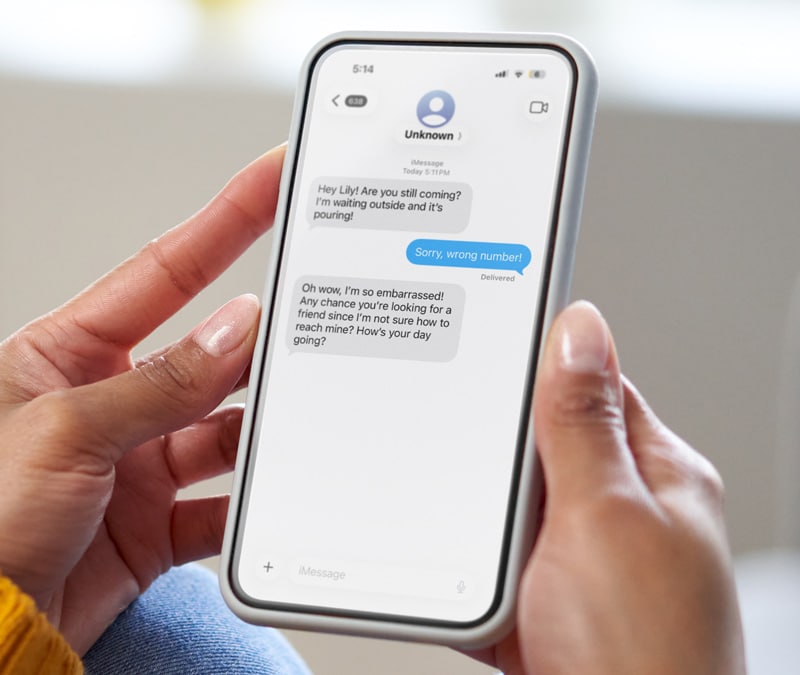

Want more?
Follow us for all the latest news, tips, and updates.